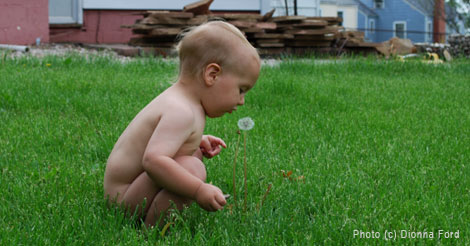|

Ten WaysTo Reduce Your Toddler’s Carbon Footprint
By Dionna Ford
Eco-conscious parents can be overwhelmed by the amount of plastic-filled, extravagantly packaged, and ultimately unnecessary items that are commonly marketed for babies and toddlers. But parents need not despair: not only is it possible to avoid the wastefulness of a commercialized childhood, it is also easier than you think to instill your Earth-friendly values in your budding activists.
Here are ten ways to reduce your toddler’s carbon footprint. And instead of simply making these decisions for your toddler, involve her in the process. Explain in simple terms why your family chooses to live sustainably. She may not understand every detail, but your words and actions will help establish a foundation of lifelong learning and environmentally conscious habits.
1. Use Cloth Diapers: If you didn’t discover the joy of cloth diapering at the birth of your child, it’s not too late when they are closer to potty learning. Collective wisdom preaches that cloth diapers make potty learning easier and faster. And, if you do cloth “right,” your child will have less of an environmental impact than if she stayed in disposables.
2. Make (or Imagine) Toys, Don’t Buy Them: Toddlers don’t need the plastic bells and whistles that are
made in China and advertised on television. Your one-year-old will be just as happy banging on a pot as she is hitting a store-bought drum. Your two-year-old doesn’t need the latest toddler gadget when there are sticks and rocks to play with. When you make toys with your toddler, she learns the value of repurposing materials. When you play pretend, you are allowing your child to flex his creative and cognitive muscles, work through tough emotions, and develop large and fine motor skills.
3. Buy Secondhand or Use Hand-Me-Downs: Toddlers (and babies) move so quickly through developmental stages – and clothes – that it makes little sense to spend the money on anything new. Look on Freecycle, shop Craigslist, garage sales, and thrift shops, and graciously accept the generosity of friends – then pass it on to the next child. Let your little one help with the donation process and inspire a lifetime of giving.
4. Give Clutter-Free Gifts: Instead of gifting stuff, give a toddler an experience. Nurture a love of science, aquatics, or animals by gifting a toddler a year’s admission to an aquarium, science or Nature center, or other local venue. Introduce a hobby by giving your child a month of gymnastics or music classes. Resist the urge to give something disposable; give something that will last.
5. Unplug: Today’s children spend more than fifty hours every week plugged in to cell phones, video games, television, and other electronics, according to a 2010 article in USA Today. Don’t start those habits early; instead, spend more time outside with your little ones. Be creative with arts, crafts, and raw/repurposed materials. Get out from in front of the boob tube and the computer. Live a little.
6. Don’t Rely on Prepackaged Foods: Skip the boxed crackers, the individually wrapped bags of fruit treats, and all of the preservatives and other unnatural substances that come along with them. Give your toddler’s growing body the more healthy nutrition found in fresh fruits and vegetables. Make your foods from scratch, together with your child. Meal preparation is a wonderful time to connect with your little one and enjoy natural learning opportunities.
7. Buy Organic and Local Foods: Food bought locally (and in season) does not have to be transported, extensively packaged, or frozen for long periods of time. Organic food does not contribute as heavily to the overload of chemicals and pesticides in our environment. Plus, taking your toddler to the farmers’ market is almost always a fun and educational experience. And if you involve your child in menu planning and food selection, you’ll probably see that she is more willing to try the foods she had a hand in choosing.
8. Skip the Assorted Useless Plastics: Sippy cups. Toys. Plastic plates. Toys. Plastic silverware. Toys. Beds. Oh – and toys. Many of the plastic things marketed to and for toddlers can be replaced with suitable (or superior) substitutes made of wood or metal. The added benefit is that wood or metal objects will likely be more durable and can be passed on from child to child or between generations.
9. Teach Your Toddler the Three Rs: It is easier than you think to teach a toddler how to separate trash. My son has known where the “plastic recycling” and “paper recycling” are and what goes in them since well before he was two years old. (We keep the rest of the recycling in a less child-friendly area.) He loves the responsibility of putting things in the recycling bins, and he also loves accompanying us to the recycling drop-off. It has been an excellent way to introduce him to the concept of reducing and recycling our waste.
10. Help Your Toddler Be a Role Model: Don’t underestimate the powerful influence your toddler can have on others. Toddlers love to share their knowledge through example or through dramatic play. If your child attends a daycare or other group setting, find ways for her to share what she does to care for the environment. Help create a school recycling center. Grow a class garden. Bring homemade snacks instead of prepackaged ones whenever it is your turn. You can do more than foster a respect for our Earth in your own children, you can help your kids be the light for others.
Dionna Ford is a lawyer turned work-at-home mama of her amazing son Kieran. You can normally find Dionna over at www.CodeNameMama.com where she shares information, resources, and her thoughts on natural parenting and life with a toddler/preschooler. Dionna also co-founded the websites www.NaturalParentsNetwork.com (a community of natural-minded parents and parents-to-be) and www.NursingFreedom.org (a site dedicated to normalizing breastfeeding), is a regular contributor on API Speaks (the blog sponsored by Attachment Parenting International).
|

